Carcassonne: Xbox Windows Phone Review
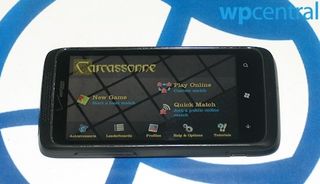
People living outside of France can probably be forgiven for a lack of familiarity with the real-life town of Carcassonne and its historical significance. According to my best friend Wikipedia, the town was fortified by walls and was strategic significant from about 100 BC to 1659. Fast-forward to the year 2000 and a German board game designer named Klaus-Jürgen Wrede created a game about building medieval cities and kingdoms by the same name. The single console adaptation of Carcassonne to date has been the XBLA version, which came along in 2007 from Sierra Online. German developer Exozet Games created their own version for Android and Blackberry in 2011, which they’ve now adapted to Windows Phone.
Gameplay
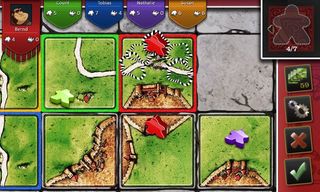
In a game of Carcassonne, 2-6 players take turns placing tiles on the board. Tiles must be connected to a tile that has already been placed, and the features of each new tile must align with whatever tile it will be connected to. In other words, grass must connect to grass, road to road, etc. The game ends when all 72 tiles (or more if playing with an expansion) have been placed.
Tiles may contain four basic features:
- City: Building cities (and scoring from them) is the main goal of the game. Some city tiles have blue medallions; these increase the point payout of the city. Cities are considered completed when they are entirely walled off by edge pieces. Upon completion, the player receives points based on the size of the city and his or her follower is returned. Incomplete cities provide a smaller number of points at the end of the game.
- Road: Like cities, players receive points and get their followers back after completing a road. Roads don’t pay as much but still provide a reliable source of points.
- Cloister: ‘Cloister’ is a British word that I was unfamiliar with before playing the game; the XBLA version calls them monasteries. These are single tiles which must be completely surrounded by 8 other tiles in order to receive your points and follower back.
- Field: Each tile contains at least one of the previous features, but most also have fields. By placing a follower on a field, the player will receive points for each field that connects to it without being divided by roads. However, the follower does not get returned to player until the game ends, so seek score from fields judiciously.
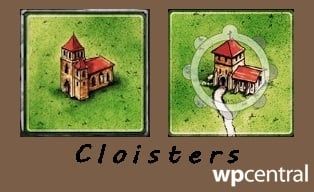
After placing your tile during a turn, you may opt to place one of your seven followers on that tile. Followers are the only way to get score, so you’ll need to use them wisely, holding on to them at times. Tie up all of your followers with incomplete cities and you won’t get enough points to win.
Competition
Once you master the general gameplay and scoring system of Carcassonne, you can start to learn how to compete against your opponents rather than ignoring them and doing your own thing. For instance, a skilled player can make it difficult or impossible for another player to finish a city by placing certain tiles near the city.
My favorite way to mess with opponents is by stealing cities or forcing them to share points. See, if the enemy has an incomplete city or road with a follower on it, you can’t just build off of that structure by directly placing your own tile and follower adjacent to it. Instead, you need to place the same type of tile and your follower at least one title away.
Once you’ve done that, you’re free to place a connecting tile between the two similar structures. Upon completion of the structure, both players will share the score for it. But if you manage to get more followers on the same structure than the enemy (by connecting non-adjacent pieces with followers), you’ll steal the structure from the other player. Tough to do, but very satisfying.
Get the Windows Central Newsletter
All the latest news, reviews, and guides for Windows and Xbox diehards.
Expansions
This version of Carcassonne includes ‘The River II’ expansion, which can be toggled on or off before starting a game. ‘The River II’ consists of 12 tiles that must be played before the core tiles come up. The tiles form a long river, with a volcano tile played at the end. This expansion makes for more interesting geography, but also adds to the game’s already lengthy play time, so I doubt many players will make use of it after unlocking its Achievement.
Single-Player
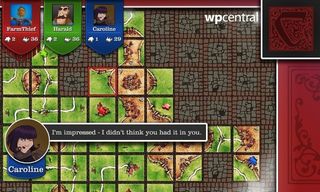
Since board games aren’t usually fun to play by one’s self, some videogame developers add new single-player modes to compensate, such as the Survival Horror mode in Zombies!!!. I hear the iOS version of Carcassonne (developed by TheCodingMonkeys, not Exozet) has its own exclusive single-player mode - though, to be fair, it sells for ten bucks instead of three. The WP7 version just allows players to select from a pool of 11 AI opponents and play a standard game. Playing against the computer can be fun, but the lack of a metagame really hurts the long-term single-player value.
Multiplayer
Carcassonne offers both pass-and-play and online multiplayer. Pass-and-play works well and could certainly provide entertainment should you and a few friends find yourselves stuck somewhere without a gaming console or physical board game to play.
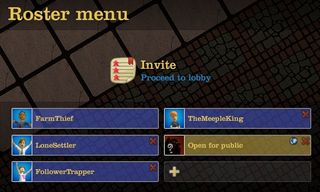
Sadly, online multiplayer is a complete bust. Up to six people can play together, which sounds great in theory. But all six players must join a lobby at the same time because Carcassonne doesn’t properly support asynchronous multiplayer. After everyone has played their first turns, they no longer need to remain online simultaneously. Even the game’s matchmaking feature, much like its inviting system, requires the host and at least one other player to look for a game simultaneously. In my experience, I never found a game – and who would want to sit with their phones running for minutes or hours on end in hopes of getting a game going? In fact, when I tried to host a public game, my screen repeatedly timed out before anyone could join.
I did manage to start a multiplayer game by inviting a friend. This requires much coordination outside of the game due to the annoying timing issue. Even then, the game's server is absolutely terrible. I couldn't invite my friend for over 10 minutes because the game just wouldn't connect to Xbox Live, even though its leaderboard connected just fine. Once we finally started our game, we both got disconnected after a few minutes of playing. You can resume a created game without the other person being online and make a move, but again, you'll fight the loathsome server issues each time you try to resume. Also, there is no way to communicate in-game - an essential feature for any online multiplayer game.

Photo courtesy of TNTJudbud
It’s both disappointing and confusing that Exozet would choose a console-like multiplayer and matchmaking setup instead of true asynchronous multiplayer like the vast majority of multiplayer phone games use. You may be able to coordinate an online game with a friend or two, but the need to be there simultaneously makes no sense and the server issues exacerbate an already terrible setup.
Update: The server issues have now been somewhat fixed by Microsoft.
Achievements
Several of the Achievements involve fun things like building a 9 tile city or stealing a city from an opponent like I described earlier. On the downside, there are two online Achievements: one for winning a game and another for winning a 6-player game. The amount of coordination required to fill up a 6-player game is ridiculous, and everyone would need to stick around for six games if they all wanted the Achievement.
Two grinding Achievements are even worse: play 200 games and accumulate 15,000 points across all games played. If you earn an average of 100 points a game, it will take 150 games to get the score-based one. Games last at least 30 minutes, so it will take an agonizing minimum of 100 hours to complete 200 of them. I like Carcassonne but I don’t want to spend the rest of my life playing against the AI for a measly couple of Achievements!
Overall Impression
The core game of Carcassonne is fantastic. Exozet has done a fine job of translating the mechanics to Windows Phone. They even include both a set of tutorials and a full reference text to help players learn. One complaint: the check button, used to advance text and confirm moves, does not always accept my taps (mostly during the tutorials). How hard is that to get right?
Still, the poorly-conceived multiplayer and cut-rate servers are the real issues with this adaptation. I can hop onto the XBLA version in the evening and find people to play against within minutes (never getting disconnected), but nobody will ever find an opponent with this version’s matchmaking. If an update was to add asynchronous multiplayer and matchmaking and solve the server woes, Carcassonne would become a must-buy for board game fans. Until then, the prospect of playing mostly single-player should be weighed heavily before purchasing.
Carcassonne – Windows Phone 7 and 8 – 45 MB - $2.99 – Store Link
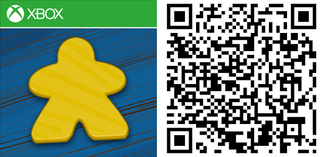
Paul Acevedo is the Games Editor at Windows Central. A lifelong gamer, he has written about videogames for over 15 years and reviewed over 350 games for our site. Follow him on Twitter @PaulRAcevedo. Don’t hate. Appreciate!

